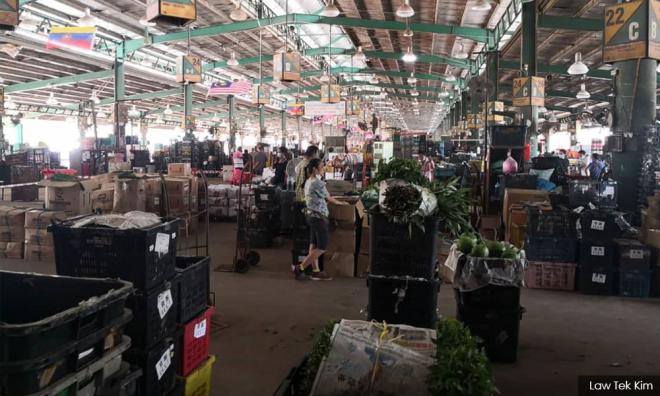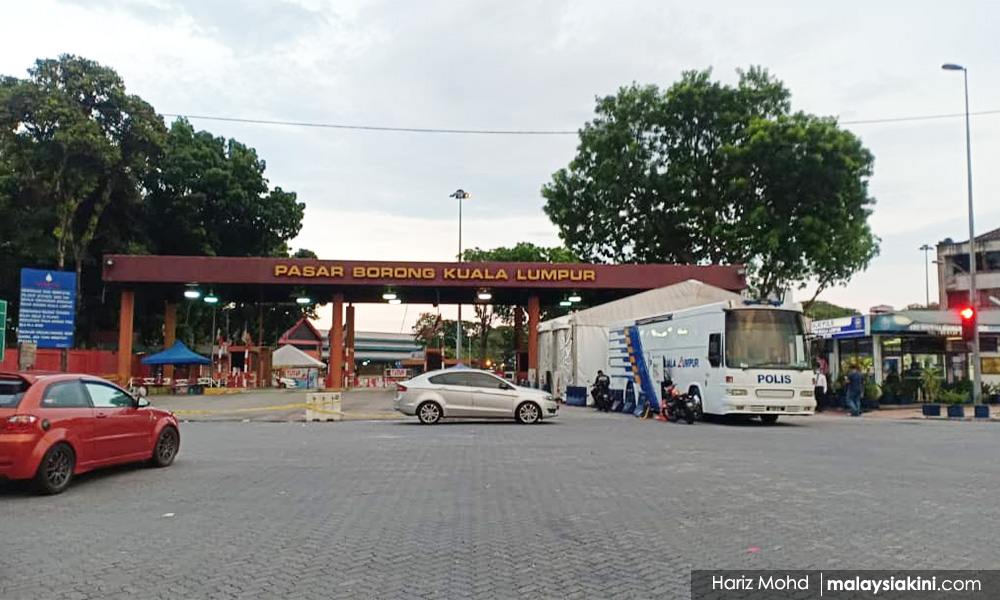
CORONAVIRUS | Traders at Kuala Lumpur wholesale market were allowed to return to work last Friday, but their problems continue to grow.
Although the market can now receive goods from producers, their warehouses in the surrounding areas are inaccessible after being cordoned off due to the enhanced movement control order (MCO).
Now, wholesalers are lobbying the government to allow them access to the warehouses to clear out an estimated 500 tonnes of vegetables, fruits, seafood and meat.
These produce, according to wholesalers, are worth an estimated RM30 million and are located in about 100 properties spread across the enhanced MCO area.
According to Chamber of Commerce and Trade of Pusat Bandar Utara president Chu Kok Ming and Kuala Lumpur Vegetable Wholesalers' Association president Wong Keng Fatt, both traders and wholesalers were caught off guard.
"I was made to understand that a few fruit traders have more than 20 tonnes of watermelon stored at their shops. This caused a shortage of watermelons in the market, and the wholesale price shot up almost double to RM2.30 per kg from RM1.20 per kg previously," said Chu.
Chu said the traders normally store watermelons, pineapples and papayas at room temperature in the warehouses because the fruits needed about three days to ripen.
"The (wholesale) price tends to drop when the fruits ripen," he said.
He said the traders might not get a decent price for high-end fruits such as strawberries, blueberries and peach after the fruit is stored more than a week inside a refrigerator.
One wholesaler, he said, has tens of thousands of eggs stored, which could go bad if they are not removed.
"I know that one of the egg wholesalers is supplying prisons and army camps. They might be affected," added Chu.
The wholesale market - the largest in the country and a transit point for most of the fresh food in the Klang Valley - was temporarily closed last Sunday for disinfection work and screening of workers for Covid-19 infections.

Meanwhile, Wong believed that most of the leafy greens and beans in those warehouses would have rotted by now and that only the melon wholesalers are safe.
"When Kuala Lumpur wholesale market closed down last Sunday, the wholesaler shifted their vegetables to the warehouses so they could send them back to the market the next day when the wholesale market reopened.
"Others only transported their vegetable containers to vacant land nearby before the area was declared an enhanced MCO area," he said.
Both organisations are working together to salvage these perishable goods owned by their members.
Wong said they had met the secretary-general of the Ministry of Agriculture and Food Industry to voice the grievances of the traders and wholesalers.
"But the ministry said the matter was not under its jurisdiction. We will meet the Federal Territories Minister Annuar Musa later today," he said.
"We are going to raise two issues. We wish the government will allow us to enter the lockdown area to take out the products.
"Secondly, we wish the government will allow us to remove our lorries parked inside the lockdown area," he said.
Both Wong and Chu said the move would help to reduce their loss to a minimum.
"Each shop is expected to incur RM30,000 in losses on average (if we could only get the products out by the end of enhanced MCO)," said Chu.
The closure of the Kuala Lumpur wholesale market due to Covid-19 outbreak had severely impacted the traders and caused tens of millions of losses to the wholesalers.
Consumers were impacted as the price of vegetables and seafood remained high, and they did not have many choices as compared with those days before MCO.
When contacted, Kuala Lumpur Hoi Seong Fish Wholesaler Association Sing Kian Hock said the wholesalers were forced to throw away 25 tonnes of seafood worth RM1 million last Saturday when they resumed operation after a five-day closure last week.
He said this was on top of the RM10 million losses suffered after the wholesalers unable to unload their seafood at the wholesale market, thus forcing them to channel the deliveries elsewhere and selling the seafood at a much lower price. - Mkini



No comments:
Post a Comment
Note: Only a member of this blog may post a comment.